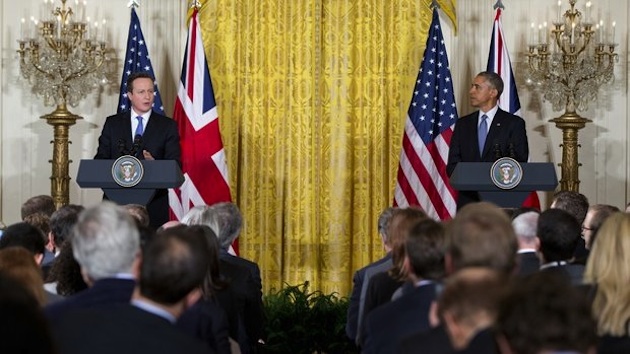

President Barack Obama and British Prime Minister David Cameron hold a joint news conference in the East Room of the White House in Washington, Friday, Jan. 16, 2015. Growing fears about the specter of terrorism in Europe and the West are lending themselves to a sense of trans-Atlantic solidarity as President Barack Obama and British Prime Minister David Cameron met at the White House. (Photo: AP/Carolyn Kaster)
President Barack Obama and British Prime Minister David Cameron Friday explained their joint-effort to lobby Congress against passing an Iranian sanctions bill. The leaders of the trans-Atlantic alliance said any new effort to impose sanctions on Iran could “fracture the global coalition and jeopardize negotiations.”
However, the carefully crafted responses were also meant to send a message to Iran.
“I don’t doubt the intentions of members in Congress, but it’s my team at the table,” President Obama said. “I will be the first one to go to Congress if the talks fail, but I am requesting Congress hold off for a few months.”
The president said he takes no option off the table, and any discussion of a response to a failed deal would also include military action.
Prime Minister Cameron said the choice was clear and “rather simple.” He said either allow the talks to move forward or take military action to prevent Iran from obtaining a nuclear weapon. President Obama, as well, said a failure would likely lead America and the United Kingdom little choice but to confront the inevitability of military action.
However, when asked to clarify if a failed deal would put America and its allies on “a war-footing” with Iran, the president backed off from the heightened rhetoric.
“I am not, repeat not stating that we are on an immediate war footing with Iran if negotiations fall,” Obama said. But as David put it, it’s simple.”
The president did admit that the chances “are less than 50/50” that a deal will be reached, but considering the alternative is war it worth the effort. Meeting with Democrats Thursday in Baltimore, Maryland, Obama and Sen. Bob Menedez (D-NJ) traded “sharp words” over the issue, with the Democratic senator growing frustrated by the fact the president didn’t seem to care that if nuclear talks failed, then the U.S. could not be expeditiously impose new sanctions.
Cameron also admitted to calling a number senators to discuss the issue.
“Yes, I did call members of Congress. I spoke to a number of senators this morning, and will speak with 2 or 3 more later this afternoon,” Cameron said. “Not as the Prime Minister of the United Kingdom trying to tell the U.S. Congress what to do, because that wouldn’t be right. But to let them know that it is my opinion that any further legislation at this time could jeopardize the very important negotiations.”
It is rare for another world leader to essentially lobby Congress on a piece of pending legislation. In fact, it has happened at no time in recent American political history.








orphan ellie / January 16, 2015
Really? President Obama is so incapable of communicating with his legislative branch that he has the British PM do it for him?!!!
/